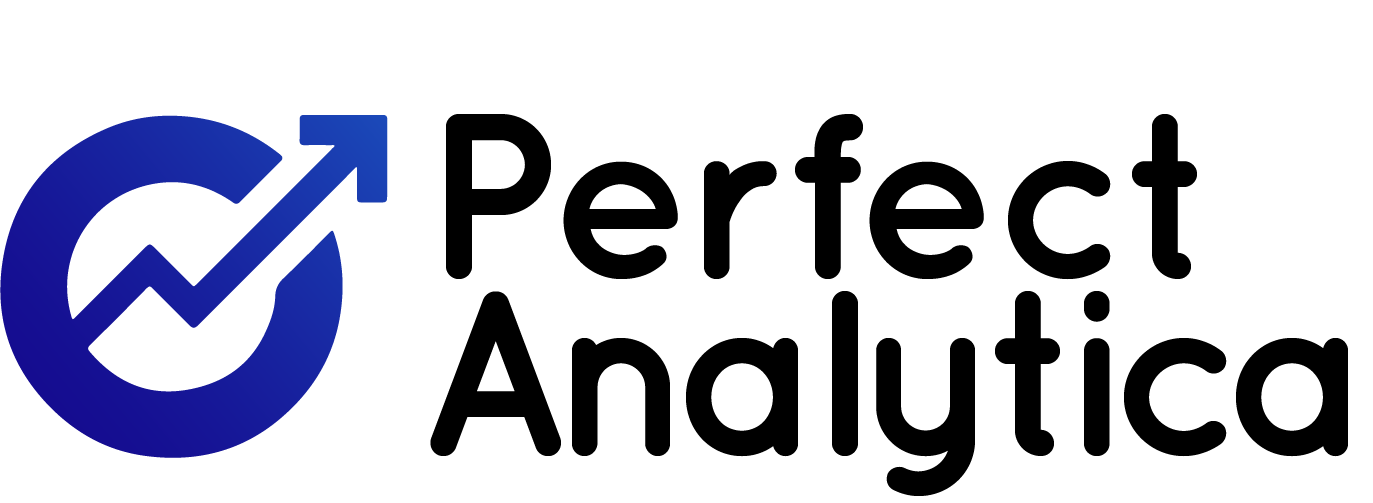Google Ads for Solar Companies [2024]
Ready to see real growth in your solar business? Read on to discover the power of Google Ads.
- Last Updated May 13, 2023
The solar industry in India is experiencing remarkable growth, as the nation strives to increase its renewable energy capacity.
The Indian government has set an ambitious target of achieving 175 GW of renewable energy capacity by 2022, with solar power playing a crucial role in attaining this goal.
India is blessed with abundant solar resources, and the government has implemented several policies and initiatives to promote solar power generation.
As a result, the solar market in India has witnessed a significant surge in demand, with an increasing number of investors and developers entering the market. This growth is expected to continue, making India a significant contributor to the global solar industry.
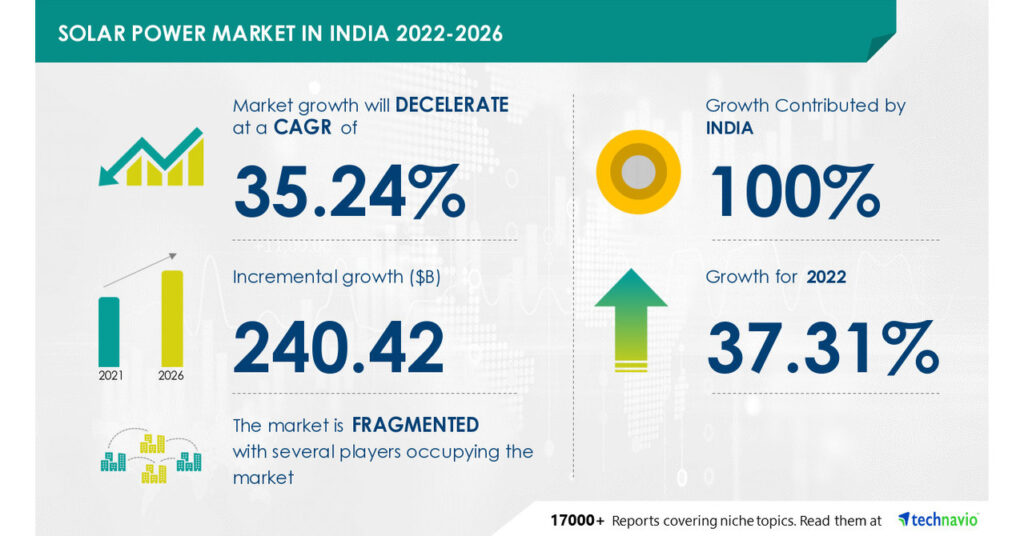
With high competion digital marketing is crucial for solar energy companies operating in India, as it allows them to reach a wider audience and effectively promote their services.
India’s solar industry is rapidly expanding, and with the increasing competition, companies need to implement effective digital marketing strategies to stand out in the market.
By utilizing various digital marketing tools, such as social media, email marketing, and search engine optimization, solar energy companies can establish a strong online presence, build brand awareness, and generate quality leads.
With a strategic and well-planned digital marketing approach, solar energy companies can stay ahead of the competition and achieve their business objectives in India’s growing solar market.
Table of Contents
Why should solar companies should run Google Ads?
A solar energy company should run Google Ads because it is an effective way to increase visibility and reach potential customers who are actively searching for solar products and services.
With the solar industry projected to grow by 20.5% in the next five years, the competition will increase, making it crucial to stand out in the market.
By using Google Ads for solar companies, they can showcase their services and products, control their advertisements, and have a better chance of being seen by their target audience.
Additionally, Google Ads allow for cost-effective advertising by setting a budget and bid limit, ensuring that every dollar spent is used efficiently.
SEO or Google Ads? What to choose?
Running Google Ads for a solar energy company is better than relying solely on SEO because it allows for greater control over advertising efforts.
While SEO can drive organic traffic, it requires a significant investment of time and resources to achieve results. Google Ads, on the other hand, provide immediate visibility to potential customers who are actively searching for solar products and services.
With Google Ads, solar companies can target specific locations, demographics, and keywords, ensuring that their advertisements reach the right audience.
Furthermore, Google Ads for solar companies can allow them for easy tracking of ROI and quick adjustments to ad campaigns, making it a more efficient way to increase leads and conversions.
7 Steps to a successful google ads for solar companies
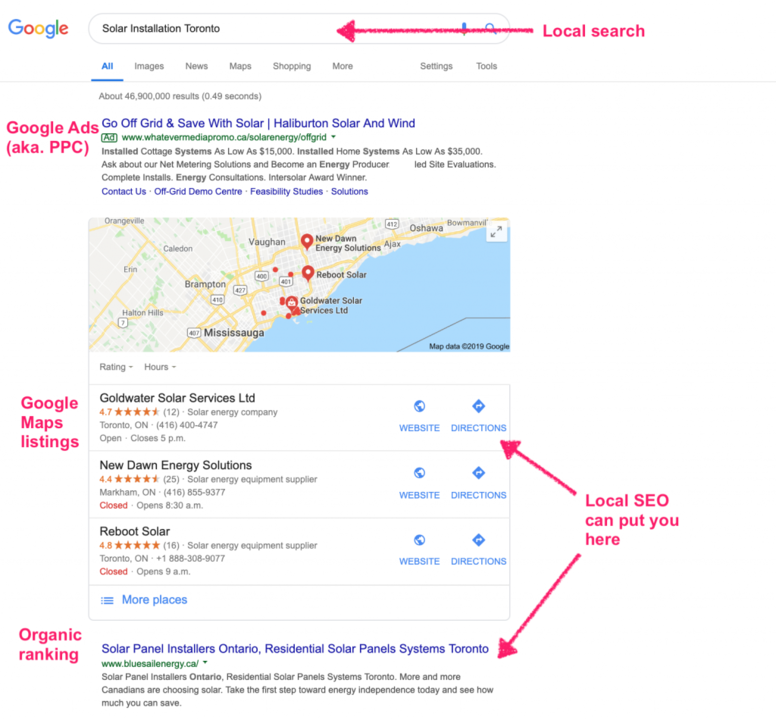
Google Ads is an internet-based advertising platform that showcases your ad whenever internet users search for keywords associated with your business. This unique form of advertising enables you to pay only for the clicks that your ad receives. This approach offers a practical solution that ensures you pay exclusively for actual results.
The solar energy market is expanding rapidly, with the solar industry anticipating a 20.5% surge in growth over the next five years. As a result, the competition in this industry is intensifying.
To stand out in the crowded market, solar companies can benefit from utilizing Google ads for their marketing campaigns. Google Ads enables solar companies to advertise online, providing an opportunity to connect with potential customers searching for solar installation services. Additionally, businesses can have complete control over their ads and promote all their solar products and services.
Setting up a Google Ads campaign is easy, and you can do it yourself by following the instructions on Google Ads’ website. If you want to create more complex ads, you can also get help from a professional Google Ads agency like Perfect Analytica.
1.1. Creating your Google Ads account
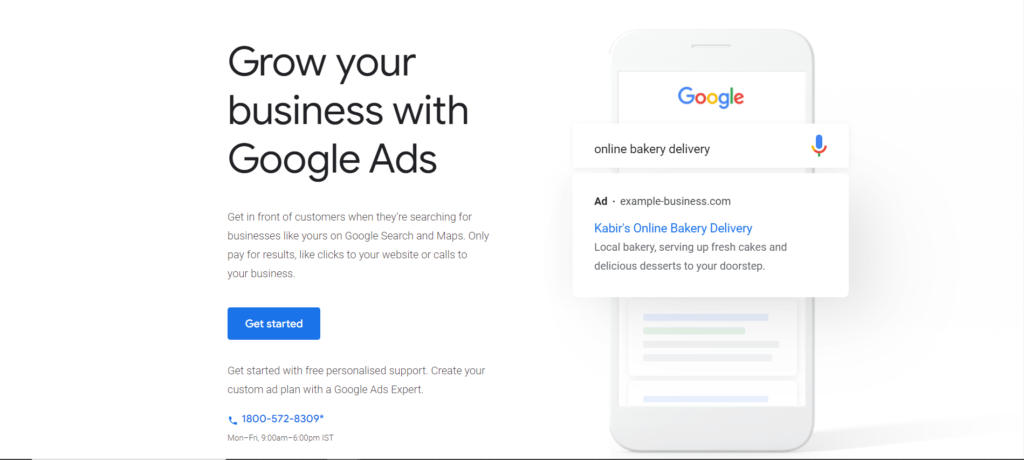
To begin using Google Ads for solar companies, you can create your account by utilizing your current Gmail/Google account. Simply visit the Google Ads website and select the ‘Get Started’ option. This will lead you to a page where you can choose the Google account you wish to sign in with.
In case if you’re doing this for the first time then you’ll be asked to create an ad account and then proceed further.
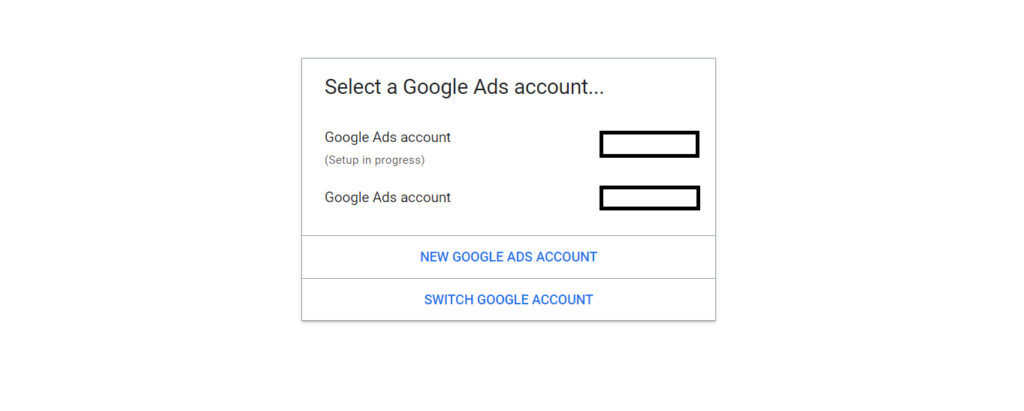
1.2. Setting Up Campaigns of Google ads for solar Companies
After signing in, you will be directed to a page where you can select your promotion objective.
If you’re new to this you better follow the available options closely related to the result you’re expecting of this campaign. Else, you can select ‘Create a Campaign with a goal’s guidance’.
This is a crucial step since it allows you to have complete control in creating your first solar ad campaigns.
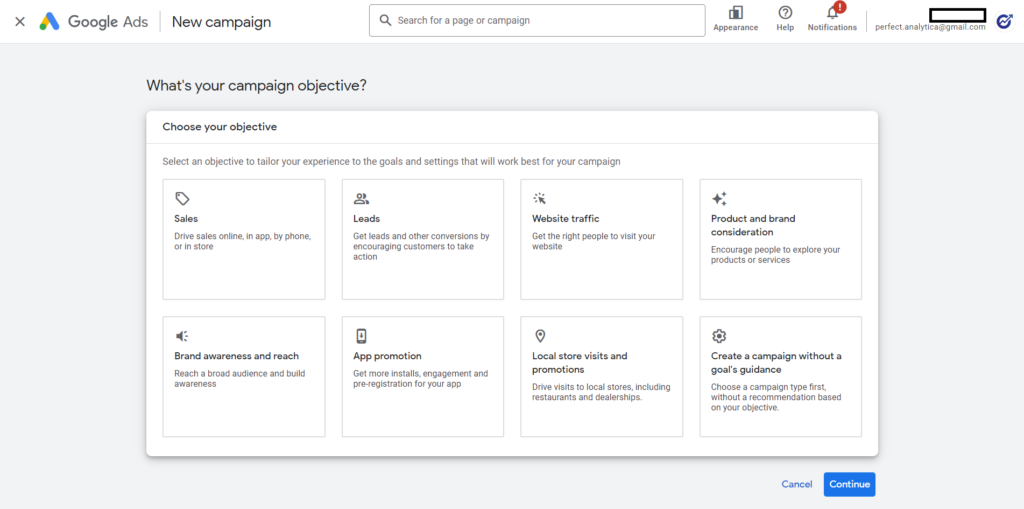
Once the campaign objective has been chosen you’ll be automatically scrolled down to choose “Campaign Type”.
Here we will move ahead with one of the most widely used “Search Ad Campaign”. So select “Search” and then click “Continue” in right bottom corner.
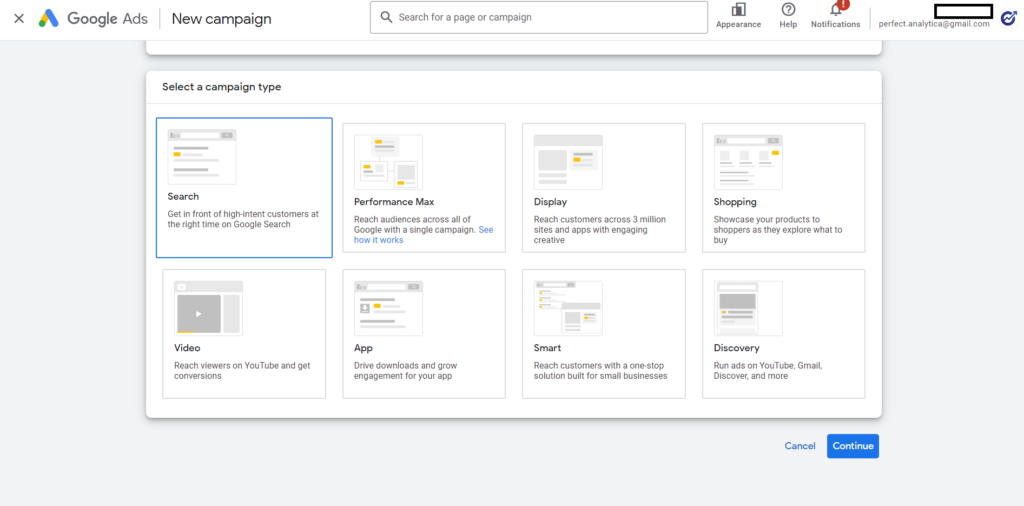
Just for your knowledge each and every campaign has its own USP (Unique Selling Proposition). Like:
- Display – Best way to engage your audience with awesome creatives
- Shopping – Next time your customer forgets to buy items from his cart; use shopping ads to showcase your products to them.
- Video – Want to tell a story or wow your customer through a video on YouTube? Get this campaign running.
- App – Want more and more people download your app, then this campaign is for you.
- Smart – When customers search for businesses like yours on Google, your ad shows in search results. On Google Maps, your ad shows directly on the map or beneath the search results.
- Discovery – Want to run a single ad and target on the YouTube Home and Watch Next feeds, Discover and the Gmail Promotions and Social tabs, you can now reach more potential customers as they browse everything from the latest fashion trends to new cooking recipe videos on popular Google properties.
- Performance Max (New) – The latest campaign introduced by Google Ads, is designed to complement your keyword-based Search campaigns to help you find more converting customers across all of Google’s channels like YouTube, Display, Search, Discover, Gmail, and Maps.

You can either choose Engagements as a goal or Other as a goal. When you choose “Engagements” then source will be YouTube and when you choose “Other” then source will be Website.
Here you’ll see an exclamation mark in “Conversion Action” as if some error is there. But don’t worry and proceed.

Then you need to select the results like:
- Website Visits
- Phone Calls
- App Downloads
Here we will choose “Website Visits” and “Phone Calls”. Hence, place your target website url and phone number where you want your audience to call.

Now name your campaign.
We usually prefer to use a specific naming template for all our campaigns. Like this:
Type of Ads-Client Name-Target Region-Product Type
This helps us identify and differentiate campaigns at ease. You can also make one for your own campaign.

Next is a very vital stage of the campaign – Bidding stage.
1.3. Building a Bidding strategy for your solar google ads campaign
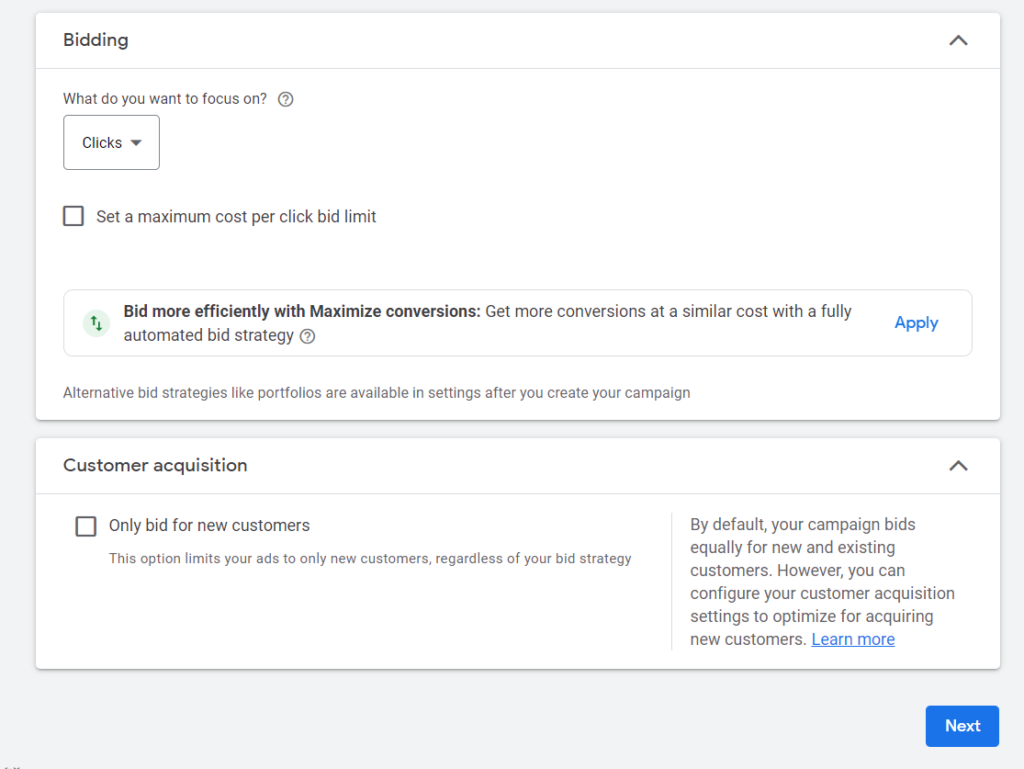
As you can see it will ask you first “What do you want to focus on?”. Google needs to identify what your area of interest is for running the campaign.
Hence, we got:
- Clicks – When you want your audience to click your ad. It can be either traffic ad or anything.
- Impression Share – Impression share is the percentage of impressions that your ads receive compared to the total number of impressions that your ads could get
- Conversions – Actions that you’ld like to happen on your website, app or store that you’re targeting.
- Conversion Value – The value of the actions taken on your website, app or store that you’re targeting.
Yeah, we know you’re more interested in “Conversions”, hence lets select it and move forward.
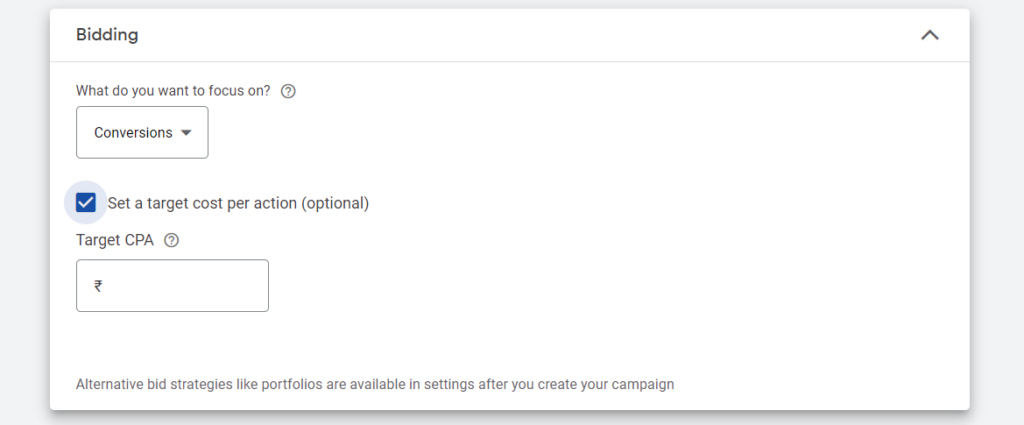
Now they provide you an option:
- To set a target cost per action
- Or leave it unchecked and let the google do the bidding on your behalf.
In case you’re new to this and ad-spend is not an issue then in order to discover what your conversion rates are you can choose second option.
Else, choose first option and set a cap on your cost per action and save your budget.
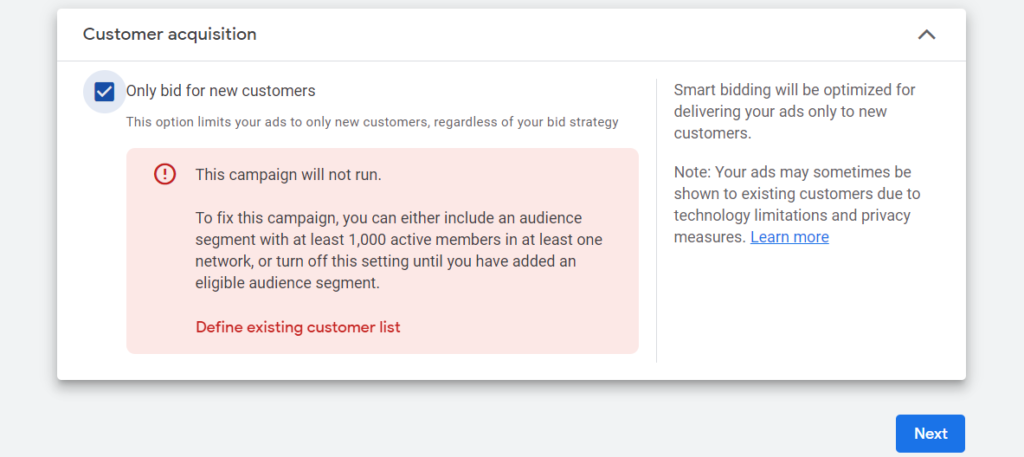
Checking “Only bid for new customers” will limit your ads to only new customers, irrespective of what your bid strategy is.
But, you need to with have an audience of 1,000 active members on that network or you’ll have to define existing customer list. If, you don’t have both simply uncheck it and move ahead.
1.4. Fine Tuning the Campaign Settings for results
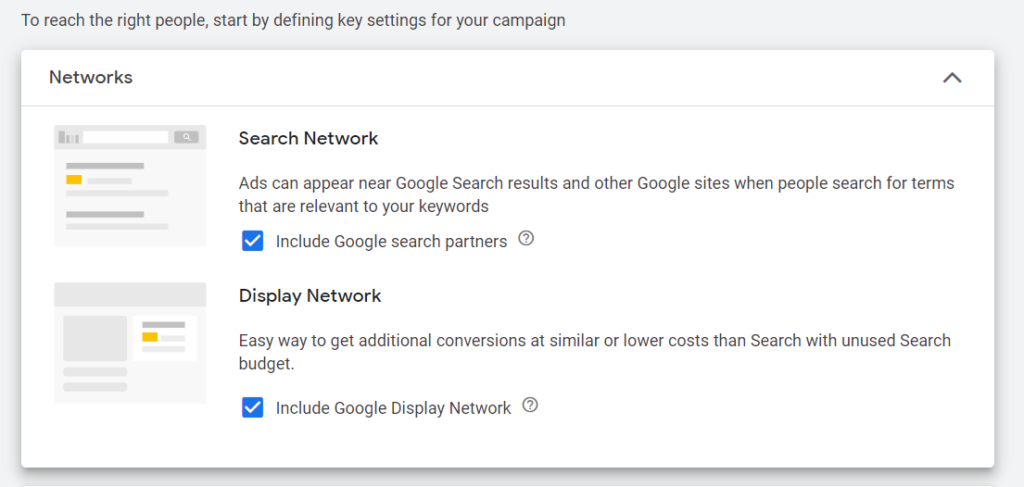
Choose the network where you want to show your ads. Choosing “Search Network” will make your ads visible on Google Search Results and other Google Search partners sites.
While, choosing “Display Network” will enable your ads to be showcased on Google Display Network”
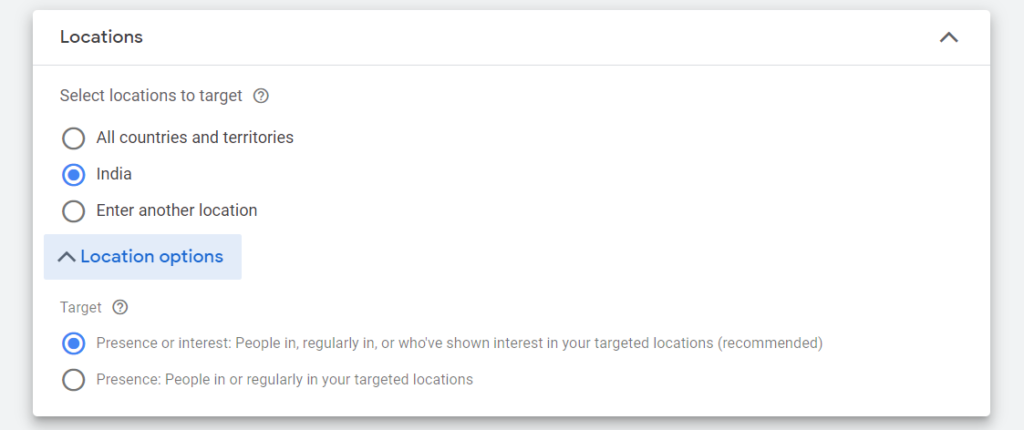
“Locations” now here is where Google lets you choose precisely the region where you want to display ads.
But there is another drop down “Location Options” which is very vital. For if wrongly choose can make all your money drain.
We will try to make it as simple as possible. Suppose you want to target people who are showing interest in Thailand. It may be as if they’re planning a visit to that country or may be doing some research about that country . Then in this case choose “Presence or Interest”
But, if you want to target only the people who live in that country or are regularly visiting that country then choose “Presence”
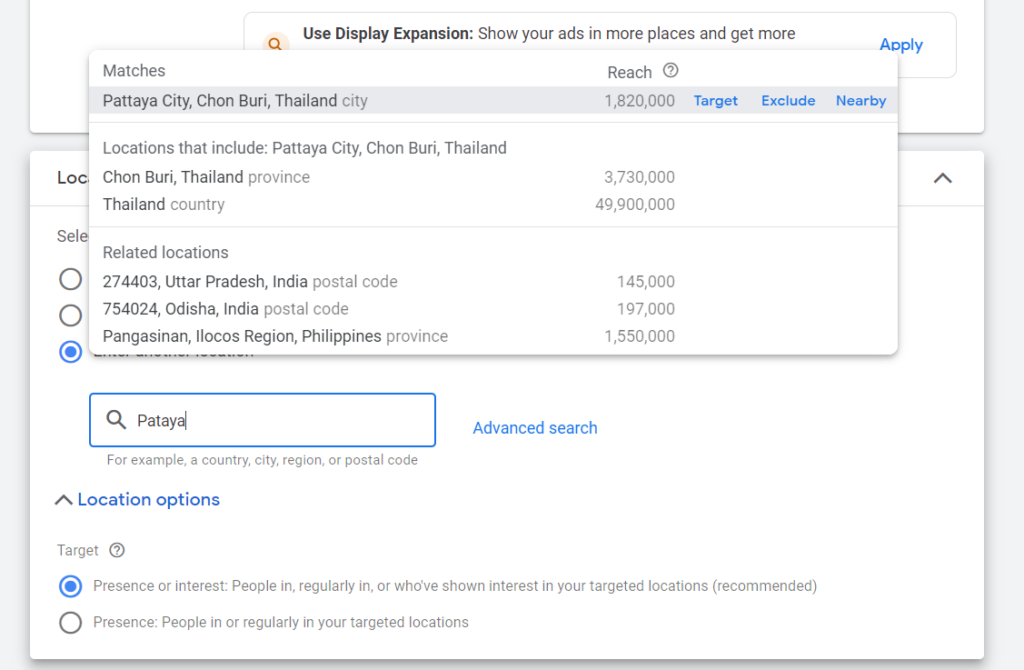
If you want to further narrow down your location, say, to a city, then in that case choose “Enter Another Location” and in the search bar write the city, region or postal code to target.
Once, the name is visible in the list you can either target that region, exclude that region from your ads or can show ads in the region nearby this city.

Usually the language selected is English, but in case you’re targeting any vernacular language then you can write down the language name in the search bar and when it pops up you can choose the same.
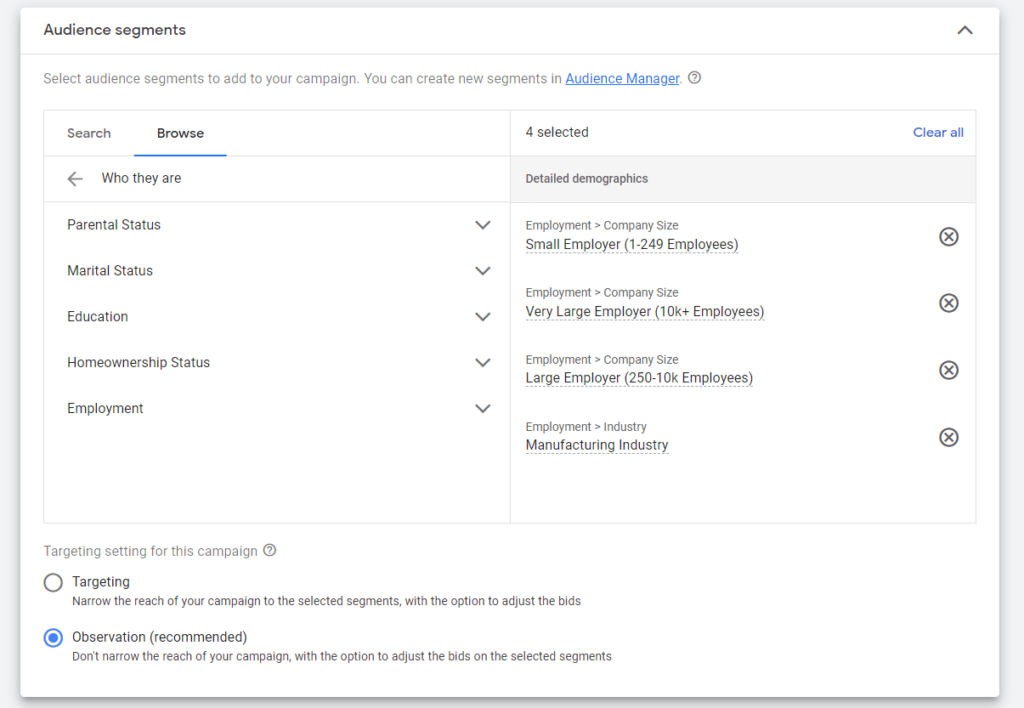
Here, we will be targeting companies which are into manufacturing industry. For this industry is huge and has a vast apetite for electricity, that makes them most favourable for solar energy seekers to reduce cost of electricity.
Also, leave the recommended option to obeservation for better results if you don’t know if this targeting will work or not.

Now you got to choose if you want to optimize your ads or not. If you choose to optimize then the Google algorithm will start the campaign with all the ads but will only continue further with the best performing ads.
In case, you do not want to optimzie, then you can just keep rotating the ads indefinitely for the entire period.

Then you can select the start date of the campaign and then the end date. If you want to keep the ads running indefinitely then select none in the end date.

Here you can delegate the exact timing when you want to run the ads. You can even schedule the ad timings differently for different days of week.
1.5. Keywords & Ads For Google Ads for Solar Companies
The foundation of every ad campaign lies in its keywords, which is why selecting the right ones for your solar ad campaign is crucial. An effective keyword should be able to answer the questions “What are you?” and/or “What do you sell?”
For instance:
- What are you? (e.g., a solar company, a solar panel installation business, etc.)
- What do you sell? (e.g., solar panels, solar installation services)
These keywords should drive relevant traffic to your website from people who are genuinely interested in hiring your services. This can help to avoid unnecessary costs and traffic for your ad campaign.
You can access Google-generated keywords for your ad group below its name. By inputting your company website and your products or services, Google can generate relevant keywords from its database.
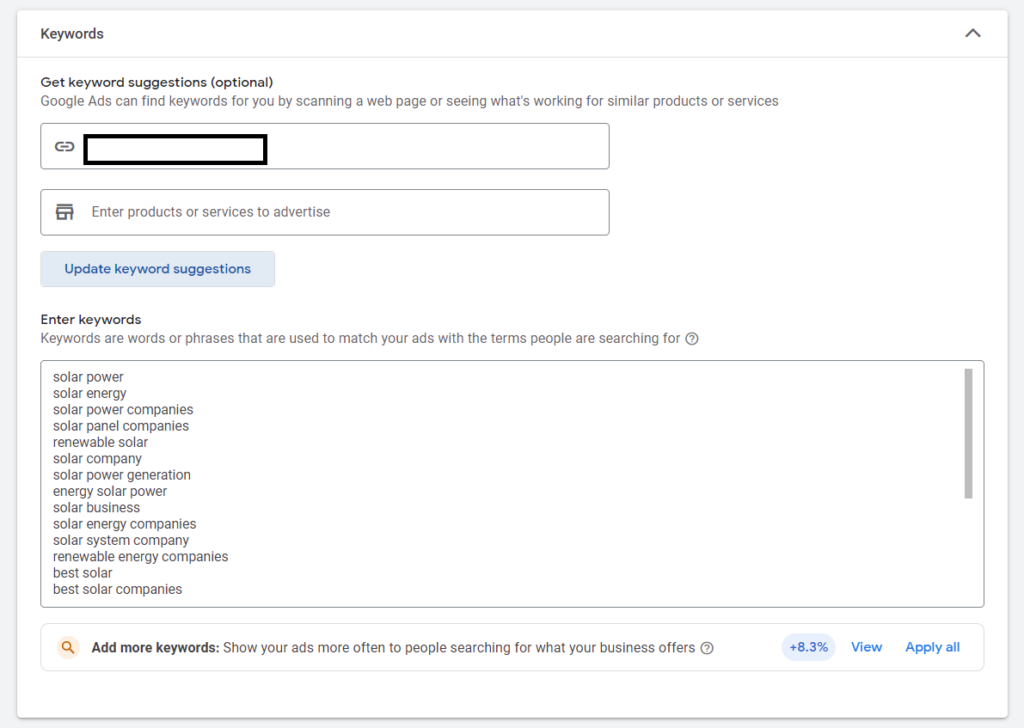
Google has launched a very cool feature in which on basis of your website url, Google’s algorithm fetches keywords that it thinks you should target.
You can easily explore them in the area and if you find any keyword missing you can simply type it down in that area.
In case, you are not aware which keywords to choose, then in the search bar where it is written “Enter products or services to advertise” enter your product or service and hit “Update Keyword Suggestions”. Then the Google algorithm will automatically re-populate the keywords on the basis of your website and product or services entered in the bar.
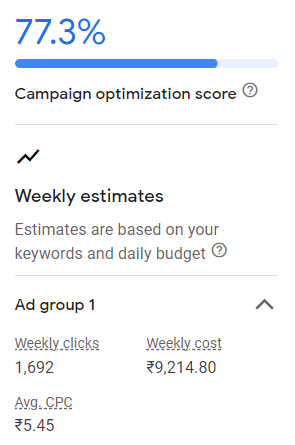
On the right side you’ll find the “Campaign Optimization Score” which indicates how well your ads will perform and also it helps you get clarity of weekly clicks your campaign will receive and what will be the weekly cost for the same.
Please note that these are purely estimates and results may vary.
Now comes the most overwhelming part of the entire process – The Ads.
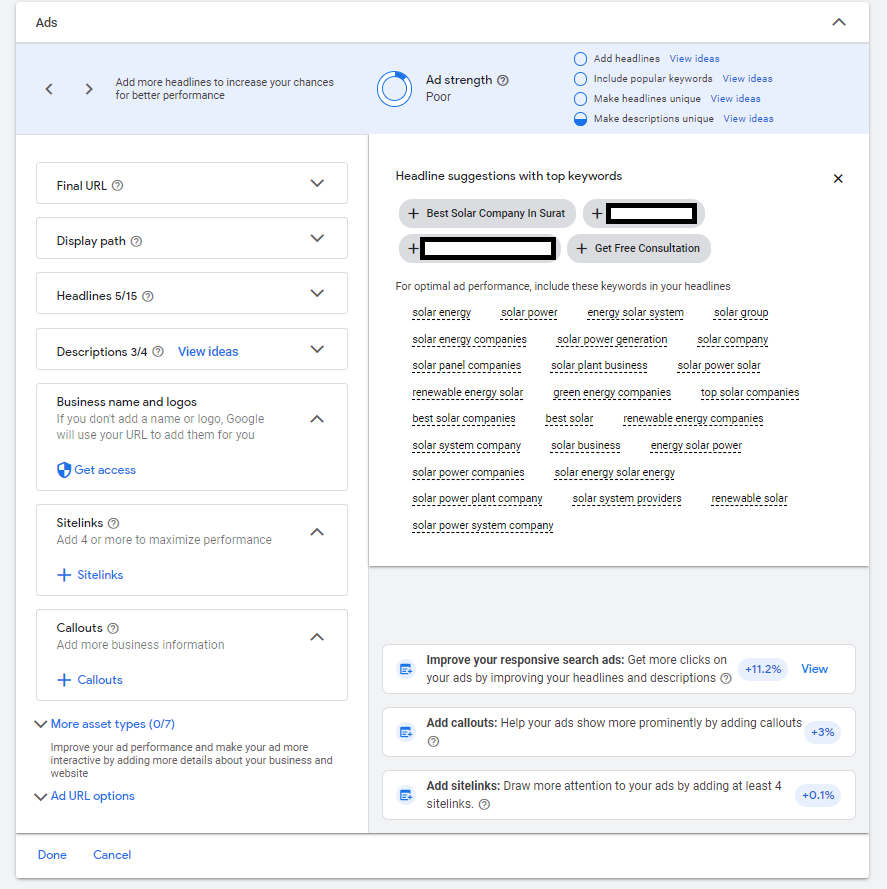
As you can see above there are lots of things that need to be done. Though Google algorithm will help you identify and fill in the gaps for you. But the success of the ad campaign is purely on your intelligence and data.
We will break the entire ads setting part into pieces and look at them one by one.
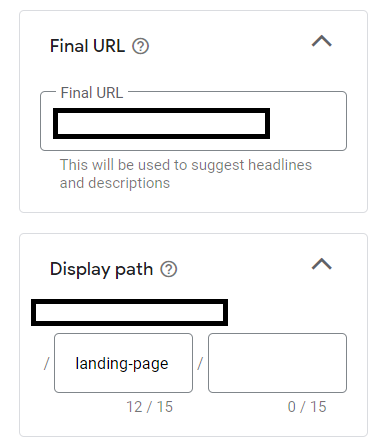
First you will have to provide the Final Url which actually be the domain url of your destination page where you want to take the person who clicks your ads.
Then you need to provide the display path, it is the exact page path which you need the person to exactly go to.
Some people have running ecommerce stores have categories in between their home url and product url hence you can see display path has two
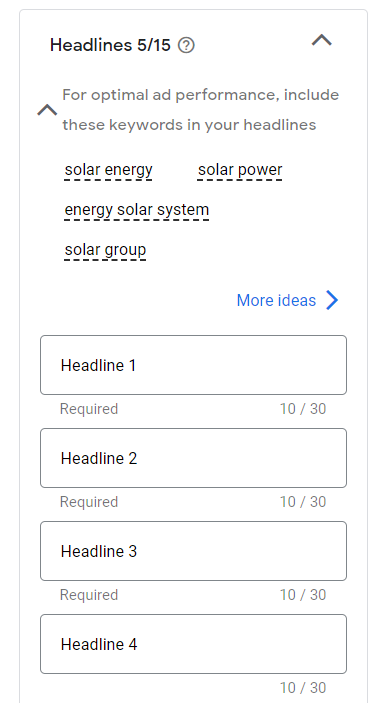
Then you’re provided to input headlines for your ad. Total of three headlines of 30 characters each are mandatory to be provided but you can go as far as 15 headlines.
Google algorithm will run ads using these headlines and using various permutations and combinations will choose a winning headline and further boost it.
It will always be a better option to include the targetted keyword in the headline so that the audience can directly see what you have for them.
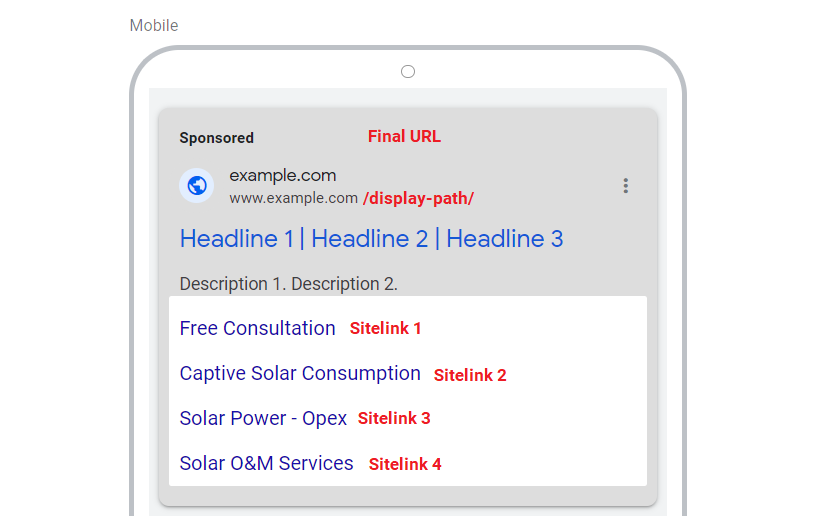
Here you can see the ad preview of how the final url and display path will be visible in the google search results.
The Headline will keep on changing along with the description.
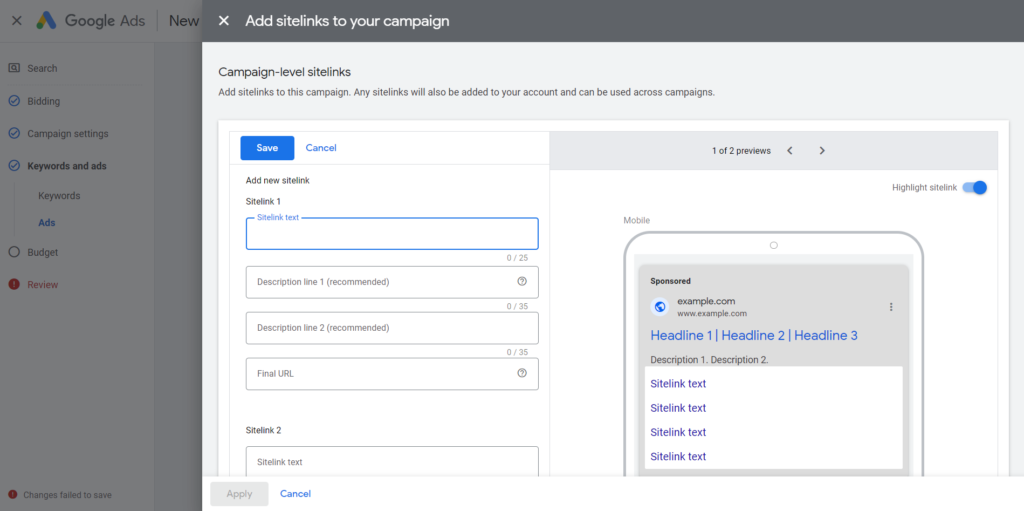
On clicking ad site links you will get this pop-up where in you will be asked to provide sitelinks.
Similar to the popular sitelinks in Google organic search results you can provide sitelinks which you want to show to your audience along with the related description and target url of that site link.
It is not necessary to provide a sitelink. But if provided that can help your audience to visit a relevant page as per his requirement. Remember that each link should be unique or else Google will not show in the ad.
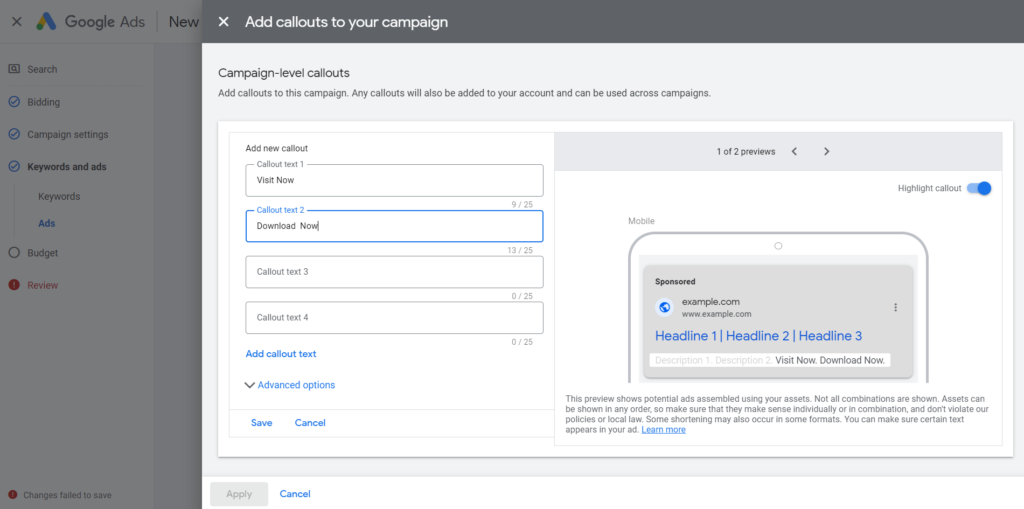
You can add a 25 characters callout for your audience as displayed in preview.
Remember, not all combinations are shown all the time. Assets can be shown in any order, so make sure that they make sense individually or in combination. You can also schedule these assets if you want to show them only on specific days or time.
1.6. Budgeting For Google Ads for Solar Companies
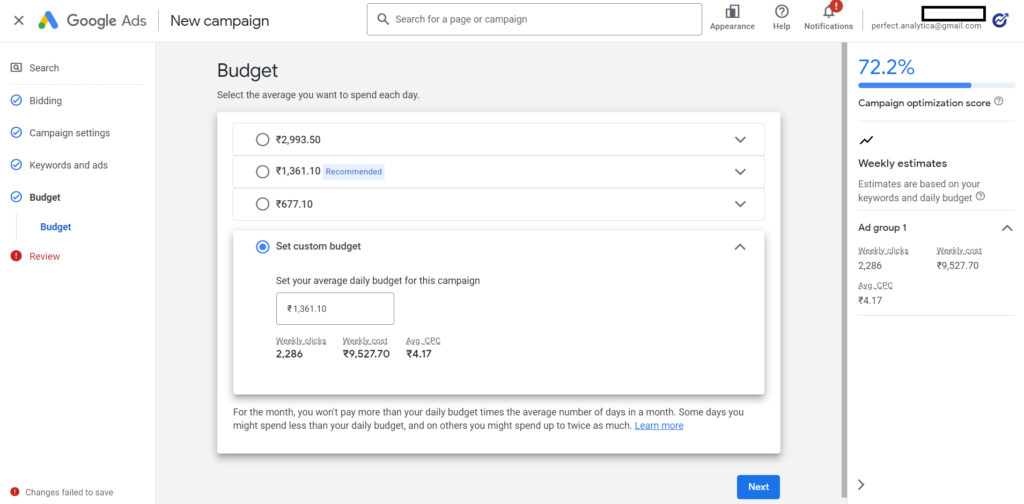
When setting your budget for your solar ad campaign, specify the amount you are comfortable spending each day. It’s important to consider the monthly volume of searches for your type of business and location when determining your budget. Since the solar industry is already competitive, if your target location includes major cities, you may want to opt for a more competitive daily budget for your ad campaign.
It’s possible that your daily budget may not be utilized entirely throughout the day, in which case Google will carry over the extra budget to the following day. Alternatively, if your daily budget is already fully utilized but there is additional traffic available, Google may spend extra to supplement the additional clicks or traffic. At the end of the month, you will be charged for the same daily budget multiplied by the number of days in the month.
The bidding process determines the cost of each click on your solar ad campaign. Additionally, you can set a maximum cost per click (CPC) bid limit, which allows you to control the highest amount you will pay for each click.
For instance, if your daily budget is ₹2,000 and your CPC bid limit is ₹100, this means that your solar ad campaign can potentially receive up to 20 clicks per day.
Bidding costs can also impact the ranking of your ad campaign. Typically, a higher bid translates to a higher rank in Google search page results. However, this is not always the case since your ad campaign’s ranking is primarily determined by its ‘Quality Score.’ The Quality Score of your ad campaign is based on factors such as the quality of your website, the relevance of your ad, and the click-through rate of your solar ad.
If you don’t establish a maximum CPC bid limit to your Google Ads for Solar Companies, then Google will automatically calculate the average bidding cost for your ad campaign. This approach can also serve as an effective technique for getting a head start with your bidding cost. Once Google has determined the average CPC bid for your ad campaign, you can manually adjust it to a value that is near the average CPC bid data.
1.7. Review of your google ads For Solar Companies
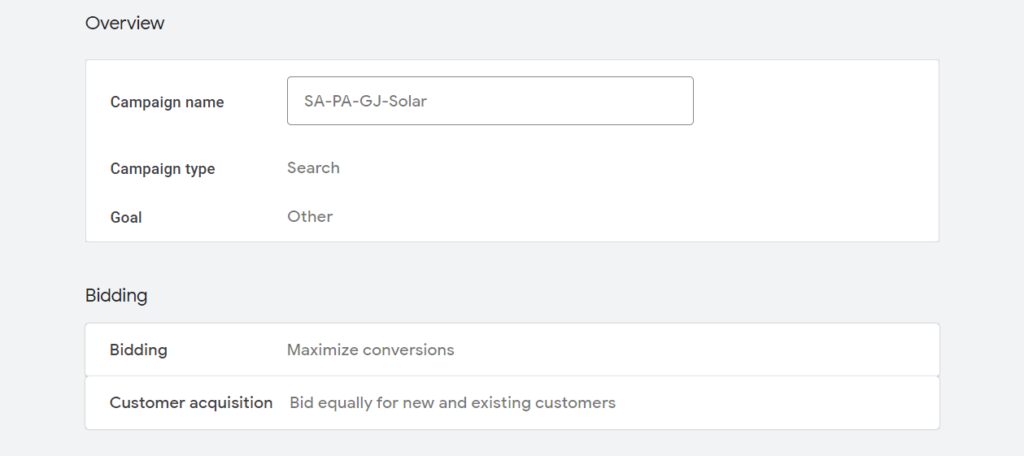
Do these with all of your ad groups and click ‘Save and Continue’. Google will review your ad campaign and look for errors and suggestions. Once everything is ready to go, click ‘Publish’.
The status of your ads will be under view and once it is active, your ad campaign will be shown to people in your targeted locations.
[Bonus] Keyword Research for your Google Ads for Solar Companies
As said earlier, keywords are the foundation of every ad campaign, that’s why it is important to choose the right keywords for your solar ad campaign. A good keyword should answer the questions “What are you?” and/or “What is your offer to sell?”
Noted below are suggested match types that you can use for modifying your keywords.
Using match type for keywords in Google Ads for Solar Companies
Broad Match – Using broad match type for keywords show your ads in even the slightest relevance from a Google search term. This is not recommended as it might drive users who don’t have the intent of buying or hiring your services.
Phrase Match – Phrase match type is where you put quotation marks on a keyword or phrase. For your ad campaign to appear, the search term should include these keywords or phrases that placed inside the quotation marks.
Exact Match – The exact match type is where you put brackets on a keyword or phrase. Your ad campaign will only show up in a search term with the exact keyword or phrase that is placed inside the bracket. Nothing longer, nothing shorter, just the exact keywords.
In order to do this keyword research we have numerous platforms or softwares available like Google Keyword Planner, but sometimes we also use Free Keyword Tool from Wordstream.
Keywords planner is a Google Ads feature that lets you discover keywords that are related to your products and services. This tool is a huge help in creating good Google Ads for solar companies.
To use keywords planner, make sure to save your unfinished ad campaign draft and go ‘Tools & Setting’. Under ‘Planning’, click ‘Keyword Planner’.
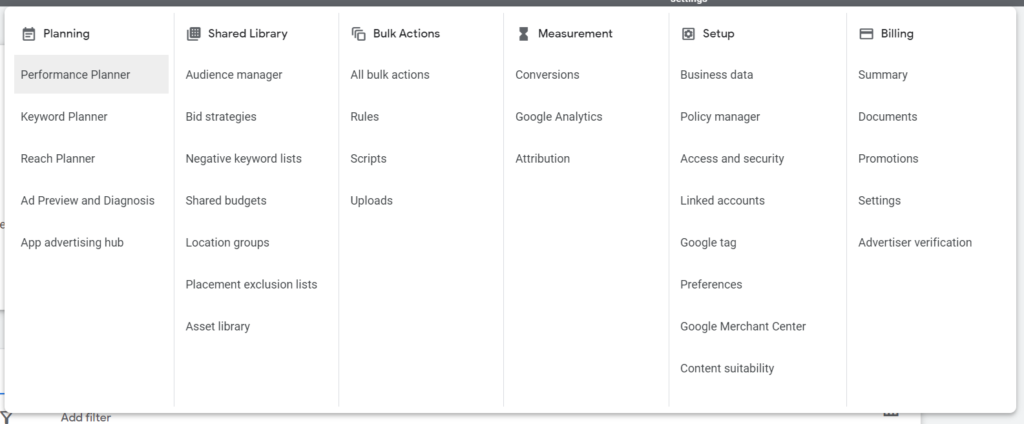
Select ‘Discover new keywords’ and it will redirect you to a page where you will indicate your product and services for keywords.
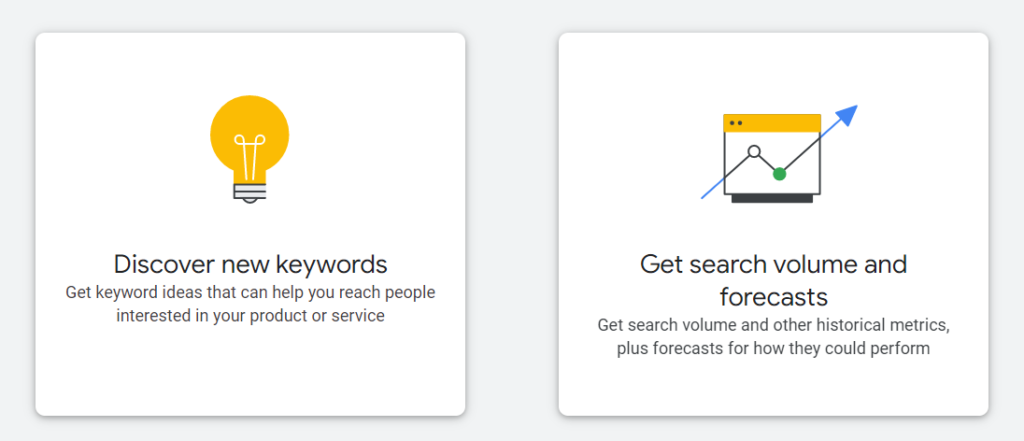
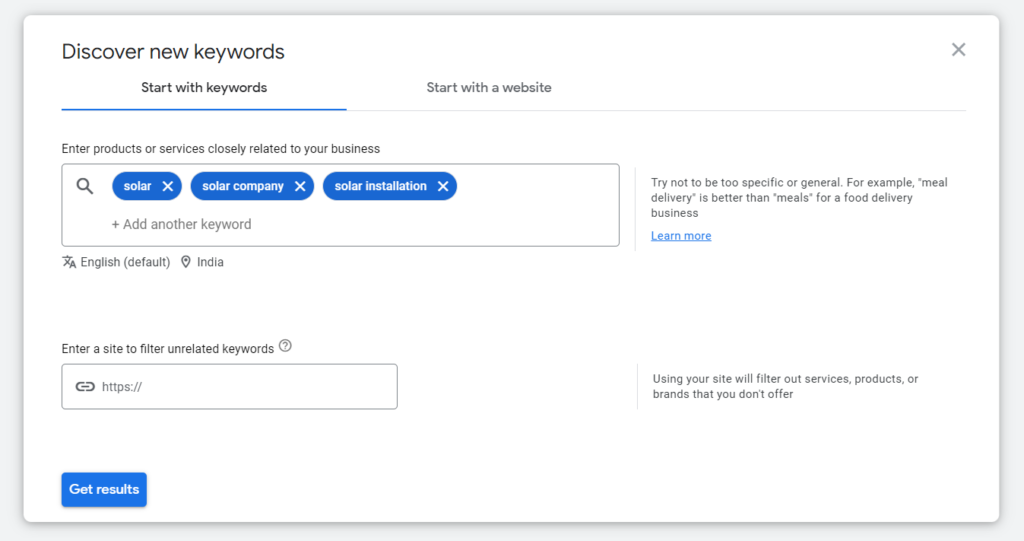
Enter keywords that are relevant to your solar products and services. Input your website for better results. Click ‘Get Results’ and Google will generate popular keywords and search terms that are related to your business and website.
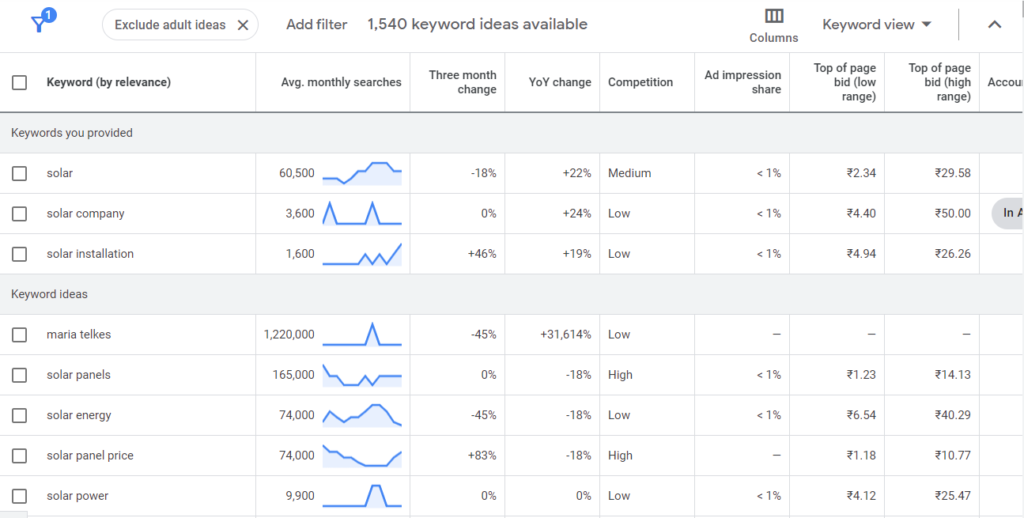
You can also use a free keyword research tool by Wordstream. In this tool you can search the keywords in two ways:
- Input a Keyword yourself or
- Input website URL
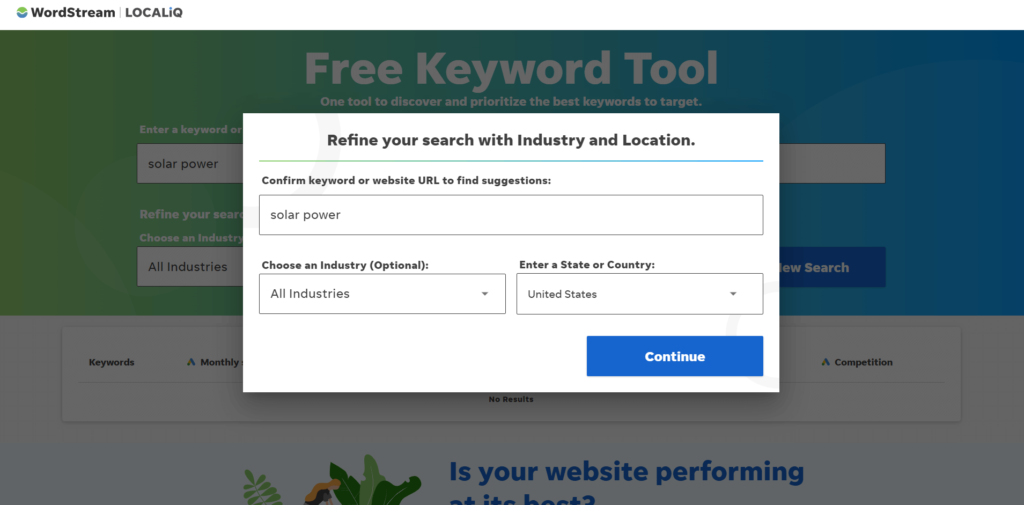
Then you’re asked to choose the industry (which is optional) from the drop down list and finally you’re asked to enter the state or country you want the keywords details. Just as you hit the button “Continue” the magic happens
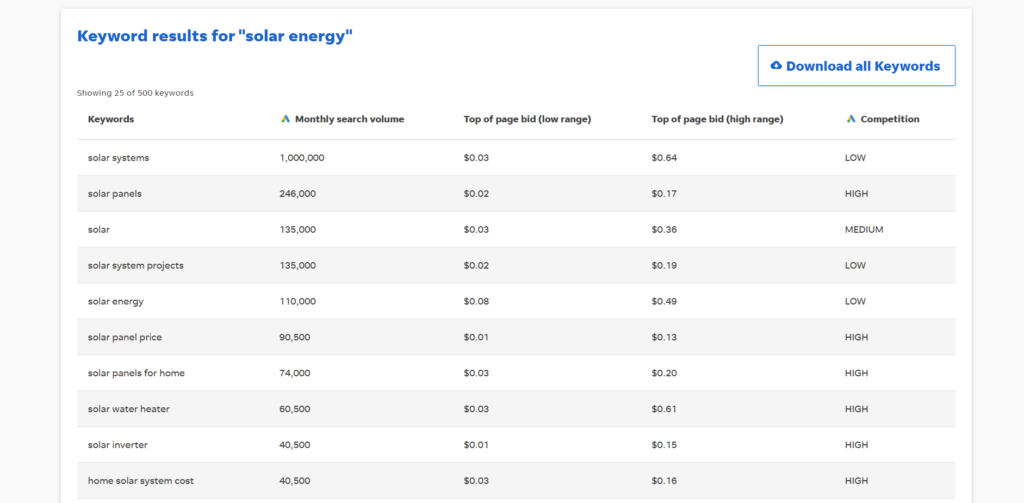
On single click you will get details of all the related keywords, along with the monthly search volume, top of page bid (high range + low range) competition.
The best part of this tool is that it allows you to donwload all the keywords that too for free.
Awesome isn’t it.
Using negative keywords in Google Ads for Solar Companies
There will be popular search terms from the keyword planner that is not directly relevant to your ad campaign. To prevent your ads from getting triggered by those unwanted keywords, you can include them in the Negative Keywords list.
Go to ‘Tools & Settings’ and select ‘Negative Keywords Lists’. Click the plus button to add your negative keywords.

We recommend including your competitors or other solar companies in your negative keywords list. It is typically not practical for your ad campaign to show up when people are searching for a different company. There is only a small chance that these people will buy your product since they are probably decided with the company that they are searching for.
But for small local businesses, using huge competitor brand names can get you customers. When a customer searches for this huge company and discovers your cheaper prices, they might change their mind and choose to hire your services. Some also search for alternative companies by putting popular brand names in their search terms.
Final Conclusion in Google Ads for Solar Companies
You can’t predict what the market exactly wants but you can use Google Ads for solar companies to help them in advertising. Now that you are familiar with Google Ads creation, get results while learning which strategy works the best for your business.
Step up your advertising game and get more customers by running google ads for solar companies or by booking your free strategy session with our experts.
SUBSCRIBE NOW
JOIN OUR MAILING LIST AND GET LATEST UPDATES AND BLOGS IN YOUR INBOX
